Ayyappan Thiyyattu
All the activities of the thiyyattu are centred around the kalam and thus it assumes prime importance. For atiyanthira thiyyattu, the kalam will be made in a few minutes whereas for a full fledged thiyyattu, it may take 5-6 hours or more, depending on the size and intricacy of the kalam and also the persons involved in creating the kalam.
The kalams of thiyyattu, as in the case of any dhooli chitra kala, is drawn with natural powders. The colours used are:
Kalam drawing starts after the uchappattu and will be finished before the evening kalam pooja.
Different kalams in Ayyappan Thiyyattu
The popular kalams drawn in ayyappan thiyyattu are:
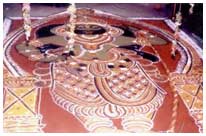
This is the basic kalam drawn with Ayyappa in the standing posture with bow and arrow in hand with a prabhamandalam (corona) around.
Go to the Top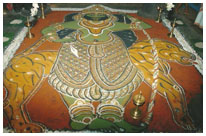
This also is a popular kalam of Ayyappa, standing in front of the vahana, tiger
Go to the Top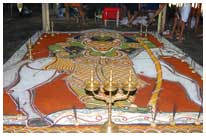
This kalam is based on a popular dhyaanam of Ayyappa with his vahana, horse. Very very rarely, Ayyappan kalam is also drawn as gaja (elephant) vahana.
Go to the Top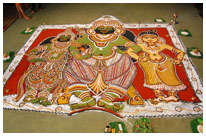
This is the most elaborate kalam drawn for ayyappan thiyyattu. Here, Ayyappan is flanked by consort Prabha on the left and son Satyaka on the right. This kalam will be much bigger than the usual ones.
Go to the Top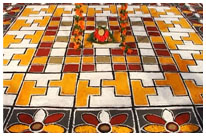
This is a complicated thantrik kalam with 17 swastikams with 24 ashta dalas around. This padmakkalam is used exclusively for the udayasthamana koothu. Thiyyadi nambiar prepares the swasthikakkalam with meticulous care, as he knows that even the slightest mistake augers inauspicious for him. In fact, this aspect is there also for cheriyeri, the invocational ritual dance connected with udayasthamanam koothu.
Go to the Top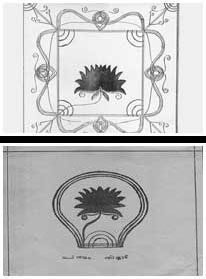
For routine daily atiyanthiram in temples, a single thamara (lotus) is designed in place of roopakkalam where thiyyattus are repeatedly performed in a single day or done in a nominal way. Two samples of such simple lotus-designed kalams are given below
Go to the Top